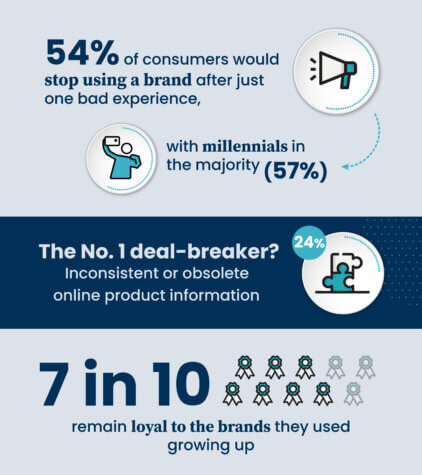NEW YORK — A whopping 54 percent of consumers would stop using a brand after just one bad experience, with millennials being the most likely to cut the cord (57%).
A recent poll of 2,000 U.S. adults found inconsistent or obsolete online product information is the No. 1 deal-breaker (24%) for consumers who “break up” with a brand they use. However, half the poll (51%) also say a great online or social media experience, such as fast replies to their questions, funny posts, and detailed how-to videos, would convince them to give the brand another try.
Two-thirds would be willing to switch brands if their initial experience with a new one is a cut above, according to the survey conducted by OnePoll on behalf of Propel Software. In fact, 58 percent have recently switched from a brand they used to love to its competitor. Almost half (47%) were enticed by an enhanced product experience, such as the availability of accessories, a better online community, or how-to videos.
Electronics see the fiercest brand competition
Of the items people were most willing to switch brands on, smartphones top the list at 37 percent, with TVs and kitchen appliances (36%) and cars (35%) following closely behind. Forty-seven percent of consumers were drawn in by the competitor brand taking a similar stance on issues that are meaningful to them, such as workforce diversity or environmental compliance.
“Our results show an increasing need for more brands to understand the customer experience isn’t limited to the point of purchase,” says Ray Hein, CEO of Propel Software, in a statement. “Two-thirds of consumers now expect brands to engage with them well after the sale, anticipate their needs, and rectify bad experiences quickly. Companies that get this right are on the fast track to gain and retain more customers than their slower competitors.”
Most respondents associate an enhanced brand experience with high quality (42%), affordability (39%), and innovation (36%). However, are brands really delivering on their promises? Among a list of well-known brands, Apple has the strongest association with superior quality (26%), while Amazon is more synonymous with affordability (41%), and Google has the biggest connection to innovation (42%).
“Unsurprisingly, 63 percent of consumers said the pandemic has greatly altered their expectations when purchasing products. Brands need to become better listeners, reevaluating how they develop their products based on consumers’ needs, from finding innovative ways to increase affordability to offering subscription-based add-ons,” Hein adds.

Brand loyalty still exists
The survey also revealed seven in 10 (69%) remain loyal to the brands they used growing up. People’s favorite brands that often carry into adulthood, include kitchen appliances (65%), recreational products such as sporting goods or camping gear (63%), electronics (60%), and office or school supplies (51%).
People listen to their spouses more than anything else when it comes to what brands are good (39%), beating out third-party reviewers (31%), celebrities (30%), and social media influencers (29%). However, recent changes in brand loyalty were most common for office or school supplies (53%), packaged goods such as soda, snacks, or cereal (52%), and recreational products (52%).
Some are willing to go the extra mile for a lifetime supply of their favorite brand’s products or services. Forty percent would give up social media for a month, 39 percent would endure household chores for a year, and 36 percent would literally run a marathon. One in three would even shave off all their hair or break up with a romantic partner.
Even though people love their favorite brands, respondents note that doesn’t mean they won’t consider competitors, especially if they turn out to be better listeners.
